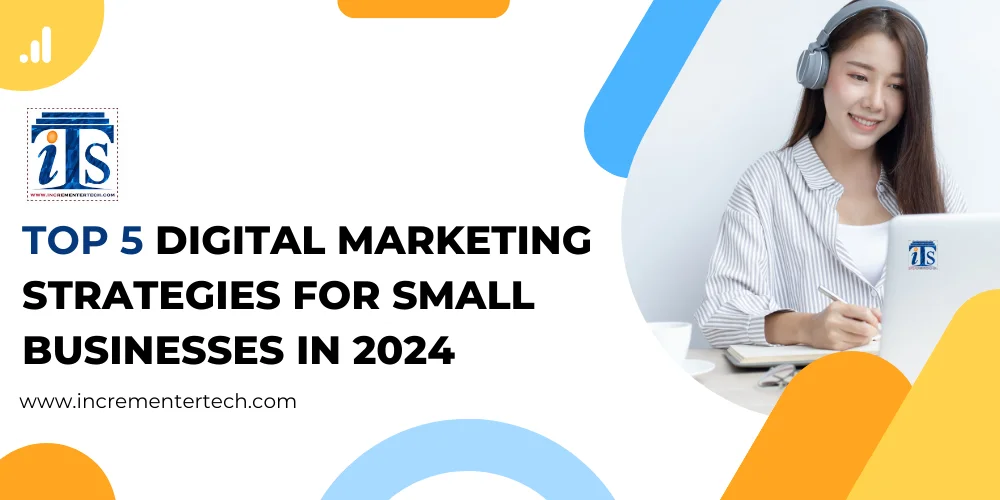
Top 5 Digital Marketing Strategies for Small Businesses in 2024-25
In today’s fast-paced digital world, having a strong online presence is crucial and rather beneficial for the success of any business. Small businesses, in particular, need to adopt cost-effective digital marketing strategies to stay competitive and grow their customer base. With the right strategies, even small businesses with limited budgets can achieve significant results.
At Incrementer Technology Solutions Pvt Ltd, we understand the challenges small businesses face when it comes to digital marketing. In this blog, we’ll explore the Top 5 digital marketing strategies that small businesses can use in 2024 to enhance their online visibility, engage with customers, and boost growth.
- 1. Search Engine Optimization (SEO)
- Why SEO Matters for Small Businesses:
- Key SEO Strategies for Small Businesses:
- Incrementer Technology Solutions Pvt Ltd specializes in SEO and can help your business climb the search rankings with tailored strategies that drive organic traffic and increase your online visibility.
- 2. Social Media Optimization (SMO)
- Why SMO is Essential:
- Key SMO Strategies for Small Businesses:
- At Incrementer Technology Solutions Pvt Ltd, we offer expert SMO services that can help you grow your social media presence, connect with potential customers, and increase brand visibility.
- 3. Facebook Marketing
- Why Facebook Marketing Works:
- Key Facebook Marketing Strategies:
- At Incrementer Technology Solutions Pvt Ltd, our Facebook marketing services are designed to help small businesses make the most of this powerful platform, creating targeted ad campaigns and engaging content that attracts and converts users.
- 4. Email Marketing
- Email marketing remains one of the most effective ways for small businesses to stay connected with customers and drive conversions. In 2024, it’s about sending personalized, value-driven emails that resonate with your audience, rather than simply promoting products or services.
- Why Email Marketing Works:
- Key Email Marketing Strategies:
- Our team at Incrementer Technology Solutions Pvt Ltd can help small businesses develop targeted email marketing campaigns that deliver results and foster long-term customer relationships.
- 5. Content Marketing
- Content marketing is one of the most cost-effective digital marketing strategies for small businesses. By providing valuable, informative, and engaging content, businesses can attract potential customers, build trust, and drive conversions.
- Why Content Marketing Works:
- Key Content Marketing Strategies:
- At Incrementer Technology Solutions Pvt Ltd, our content marketing services help businesses create compelling content that resonates with their audience and improves SEO performance
One of the most effective digital marketing services for small businesses is Search Engine Optimization (SEO). SEO focuses on optimizing your website so that it ranks higher and in top positions of search engine results, making it easier for potential customers to find your business online.
- Cost-Effective: Unlike paid ads, SEO targets users who are actively searching for products or services like yours. With the right strategy, you can generate organic traffic without paying for each click.
- Builds Credibility and Trust: Websites that rank higher on search engines are often perceived as more credible by users.
- Long-Term Benefits: Once your website ranks well, it can continue to attract visitors without ongoing costs, providing a sustainable flow of traffic.
- Keyword Optimization: Research and incorporate relevant keywords that potential customers are searching for.
- On-Page SEO: Focus on optimizing page titles, meta descriptions, header tags, and images.
- Content Creation: Publish high-quality blog posts, articles, and other content that addresses customer pain points and incorporates targeted keywords.
- Local SEO: If you have a physical location, ensure your business is listed in local directories and on Google My Business to improve visibility in local searches.
In 2024, Social Media Optimization (SMO) remains one of the most powerful tools for small businesses. With billions of active users across various platforms, social media provides an opportunity to connect with your audience, build brand awareness, and drive sales.
- Direct Engagement with Customers: Social media platforms allow businesses to interact directly with their customers, fostering loyalty and building a community around your brand.
- Targeted Advertising: Platforms like Facebook, Instagram, and LinkedIn offer highly targeted advertising options that can be very cost-effective for small businesses.
- Content Virality: Creative and shareable content has the potential to go viral, reaching a wide audience without additional cost.
- Content Strategy: Develop a consistent posting schedule that shares valuable, engaging content, including promotions, product updates, and industry insights.
- Use Visuals: Images and videos tend to engage users more than text.
Incorporate visually appealing content like infographics, short videos, and user-generated content to increase engagement.- Leverage Hashtags: Hashtags help your posts reach a broader audience. Use relevant and trending hashtags to make your posts discoverable.
- Engagement: Actively engage with your followers by responding to comments, liking posts, and sharing content to build stronger relationships with your audience.
Facebook remains one of the most powerful platforms for small businesses. With over 2.8 billion active users worldwide, it provides a vast audience for businesses to tap into. However, effective Facebook marketing requires more than just posting regularly—it’s about creating targeted, engaging content that resonates with your audience.
- Large, Diverse Audience: Facebook’s massive user base means you can target a wide variety of potential customers based on location, interests, behaviors, and demographics.
- Affordable Advertising: Compared to traditional advertising channels, Facebook marketing offers a more budget-friendly way for small businesses to reach their audience through highly targeted ads.
- Analytics and Insights: Facebook provides robust analytics tools that help you measure the success of your campaigns and refine your strategy.
- Paid Advertising: Facebook Ads allow you to target specific audiences based on interests, age, gender, location, and more. Experiment with different ad types, including carousel ads, video ads, and sponsored posts.
- Engaging Content: Share content that encourages interaction, such as polls, contests, and behind-the-scenes looks at your business.
- Facebook Groups: Create or join Facebook Groups relevant to your industry to engage with potential customers and establish your brand as an authority.
- Direct Communication: Email allows you to communicate directly with potential and existing customers, keeping them informed about new products, special offers, and business updates.
- Highly Measurable: Email marketing platforms provide insights into open rates, click-through rates, and conversions, helping you fine-tune your approach.
- Low Cost: Compared to other digital marketing strategies, email marketing is relatively low-cost and highly effective.
- Personalization: Use your customer data to send personalized emails that cater to the individual’s interests or past interactions with your business.
- Build an Email List: Encourage website visitors to sign up for your email list by offering incentives such as discounts or exclusive content.
- Automated Campaigns: Set up automated email sequences for welcome emails, abandoned cart reminders, and follow-up emails to keep your audience engaged.
- Builds Authority: Regularly publishing high-quality content positions your business as an authority in your industry, attracting both customers and search engines.
- Improves SEO: Consistent content creation, such as blogs, articles, and videos, can improve your SEO by targeting relevant keywords and driving organic traffic to your site.
- Fosters Engagement: Engaging content encourages users to interact with your business, whether by sharing your posts, commenting, or clicking on links.
- Blogging: Start a blog that addresses your customers’ pain points, answers their questions, and provides valuable insights related to your industry.
- Video Content: Create short, engaging videos that showcase your products or services, or provide tutorials and tips that your audience will find helpful.
- Infographics: Share visual content that simplifies complex ideas, making them easier for your audience to understand and share.

